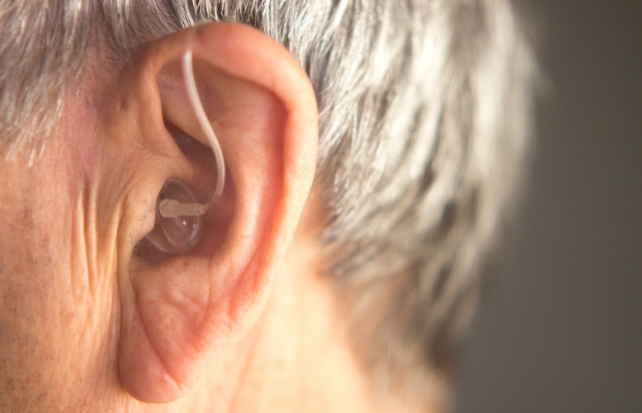Can't Hear People When It's Noisy? A Study Links This to Dementia Risk
Hearing is a skill most of us take for granted. But research suggests that adults should listen out for changes in their hearing, as hearing difficulties might be linked to developing dementia at an older age.
In a 2021 study of over 80,000 adults over the age of 60, those who had trouble hearing speech in noisy environments had a greater risk of dementia, which is an umbrella term for conditions characterized by memory loss and difficulty with language and other thinking skills.
But there's an upside, too: The study added to evidence suggesting hearing problems may not just be a symptom of dementia but actually a risk factor of dementia that could possibly alert people, their families, or doctors to its onset before any deterioration begins.
"There has been a particular interest in hearing impairment and whether that can increase the risk of dementia," said epidemiologist and study author Thomas Littlejohns of the University of Oxford in July 2021.
"Whilst preliminary, these results suggest speech-in-noise hearing impairment could represent a promising target for dementia prevention."
In 2017, hearing loss was listed along with smoking and physical inactivity as one of nine major, modifiable risk factors of dementia. That landmark Lancet report was soon updated in 2020 to include three more risk factors, taking the total to 12. In 2024, a third update of the Lancet report added another two, for a new total of 14 modifiable risk factors.
The keyword there is modifiable: These risk factors are elements of our lifestyle and general health that can be improved, and if so, may boost our overall health and reduce the odds of health conditions.

It has been estimated, in those Lancet reports, that of those dementia risk factors, hearing loss might have the highest burden of all – such that people with unaddressed hearing loss in midlife are up to five times more likely to develop dementia.
To investigate this, the University of Oxford researchers behind this study tapped into the UK Biobank, a research database set up to tease out the links between genetics, environmental factors, and health outcomes across a large chunk of the UK population.
Dementia risk was analyzed for a group of more than 82,000 women and men, aged 60 years or older, who were free from dementia and had had their hearing assessed at the beginning of the study.
The participants were tested on their speech-in-noise hearing, which is the ability to pick out snippets of speech in a noisy environment – in this case, recognizing spoken numbers against white background noise.
After 11 years or so, 1,285 participants had developed dementia, based on health records.
"Participants who had worse hearing had almost double the risk of developing dementia compared to those who had good hearing," said Littlejohns.
Interestingly, about half the people in the study who had insufficient speech-in-noise hearing, and roughly 42 percent of those who performed poorly on the test, didn't notice any hearing impairment themselves when asked to report it.
The researchers also considered whether people's hearing impairments were actually tied to other factors known to influence dementia risk, such as social isolation and depression, both of which might eventuate if people have trouble hearing.
"But we found little evidence that this was the case," said Littlejohns.
Just to be sure, Littlejohns and his colleagues also made some comparisons in the data to see whether or not people's hearing performance may have actually been impacted by underlying, undetected dementia – what's called reverse causation.
But the risk of dementia indicated by hearing difficulties was no worse comparing study participants who developed dementia sooner (after 3 years) rather than later (after 9 years); it remained about the same.

This wasn't the first study to find a link between hearing loss and dementia, but the team said it was among the first to investigate dementia risk and people's hearing ability in noisy environments, which are more typical of our everyday.
Similarly, lengthy and large studies from Australia and Taiwan have also found people who are hard of hearing have a greater risk of dementia. However, these studies relied on self-reported data from study participants, or on medical records denoting hearing loss.
"Large studies like the UK Biobank are powerful tools for identifying genetic, health, and lifestyle factors linked to conditions like dementia," neuroscientist Katy Stubbs, from Alzheimer's Research UK, a research charity, said of the University of Oxford study. "But it is always difficult to tease apart cause and effect in this type of research."
Remember, the best epidemiological studies can do is find associations between environmental factors, health, and disease, on a population level.
"It's important to bear in mind with this type of study design you can't infer causality," said Littlejohns, "but this adds to the existing literature that hearing impairment could be a modifiable target to reduce the risk of developing dementia."
Let's not forget either, this research suggested that protecting our ears against hearing damage, with earmuffs and earplugs, and helping people hear better with hearing aids, could potentially help mitigate this potential risk factor of dementia, which affects millions worldwide.
Too few people in this particular study were using hearing aids to reach any firm conclusions just yet and clinical trials will be needed before we can say more. But it's an area of investigation that may offer hope in our understanding and prevention of dementia.
The study was published in Alzheimer's & Dementia: The Journal of the Alzheimer's Association.
A version of this article was first published in July 2021.



